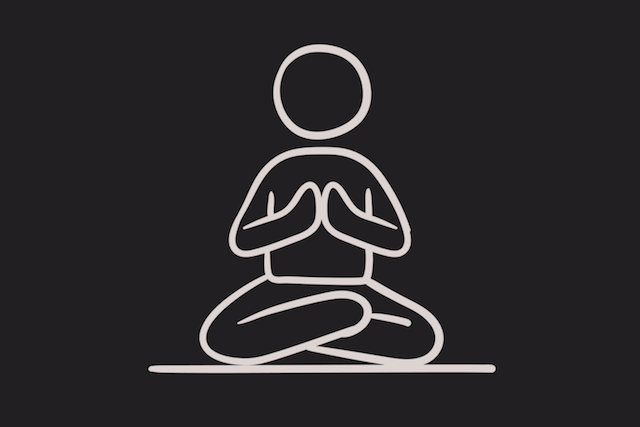
“Striving for excellence motivates you, striving for perfection is demoralizing.” ~Harriet Braiker
The last three months I’ve been trying an experiment. It’s something that I’ve never done before, and in a certain way, it’s been a huge challenge. However, in other ways, it’s been an enormous stress relief, and I would say a largely successful effort.
What I’ve done seems to go against conventional wisdom, but that doesn’t mean it wasn’t a wise choice.
So what exactly is this challenge? Well, I have actively gone out of my way to be average.
Yep, sounds a little weird, doesn’t it? But hear me out.
Over the past year, I’ve become more aware than ever of how much unconscious stress I put on myself to be above average. I’ve always known I have a type-A personality, but I didn’t know to what extent this was doing me harm. A large part of this realization came from journaling my dreams and discussing them with a psychotherapist, and another part came about through a mindfulness practice.
So for six months, whenever I felt like relaxing, and the little voice in my head would pop up and tell me I could be doing more in this moment, I would ignore it. I would decide to watch that extra episode on Netflix. I would choose to sleep in the extra fifteen minutes. I would leave the little bit of extra work until tomorrow.
What came out of this was unexpected. The more I ignored the voice, the more loud and aggressive it became.
Coming into contact with this part of myself ultimately did three things.
Firstly, it showed me that I had an issue with perfectionism that I wasn’t entirely aware of. Secondly, it showed me just how tricky and persuasive the little voice of perfectionism could be. And finally, and most importantly, it taught me how overcoming that perfectionist tendency could lead to less stress, more productivity, and greater well-being.
So, the moment of truth. How do you know you’re a perfectionist?
- You often feel weighed down by fear of your goals not succeeding
- You’re constantly looking for the ‘right’ moment to do something
- You have a persistent sense of dissatisfaction with what you’ve achieved
- You obsess over small mistakes that have little impact on the big picture
- You neglect self-care in favor of achievements
I came up with five psychological strategies to overcome this perfectionism. This has allowed me to take steps toward accepting the average parts of myself, and it’s helped me let go of a shocking amount of hidden stress.
I’ve decided to share these steps with you here so you can begin to accept who and where you are, and enjoy the journey a little more.
1. Rethink what it means to be average.
In our society, we often consider anything less than greatness to be failure. That’s not an exaggeration; it’s just the reality of our skewed notions of achievement that have failed to account for larger and more interconnected societies in which it’s increasingly difficult to stand out.
When we hear the terms “average” or “mediocre” we consider them dirty words, although they’re supposed to denote the middle of the pack. If you are average at something, that shouldn’t have any correlation whatsoever to your self-worth. Most people are average at most things for most of their lives. Does that mean that most people should feel bad about themselves?
Accepting the ways in which you are average doesn’t mean you can’t strive to achieve greatness in some areas of your life. All it means is that the desire to excel doesn’t need to be driven by the feeling that you are incomplete. It can be out of the love of competing with your past self, the need to serve your community, or even just the enjoyment of a challenge in the present moment.
2. Challenge the all-or-nothing fallacy.
Perfectionism is a direct result of the all-or-nothing fallacy, also known as black-and-white thinking. When we believe that our value is completely tied to our achievements, for example, we cannot help but obsessively strive to do everything the right way, because any mistake would undermine our entire self-worth.
We can also see this when we look for the one perfect moment to get started on something, when we put all our efforts into one project and neglect our health, and most toxically, when we try to evaluate our life against the over-generalized boxes of success or failure.
When you see this type of thinking emerge in your psyche, challenge it, and replace it with more nuanced explanations.
For example, I used to believe that I was either being productive or lazy. When I was being productive I wasn’t being lazy, and when I wasn’t being productive I was being lazy. I’ve started to challenge that idea with the more nuanced explanation that breaks are sometimes lazy and sometimes productive; they serve many purposes. They can be reinvigorating, rewarding, and sometimes need no justification.
3. Become friends with what you don’t know.
Another key trait of perfectionism that I saw in myself is a strong desire to control outcomes. We have this tendency partly because we have a heightened fear of things not going the way we want or expect.
In part, this is because perfectionism creates stress, and when we are stressed we start to become more susceptible to cognitive biases. For example, we may believe that if things don’t go the way we anticipate, everything will fall apart, we will lose out on opportunities, or we will be criticized by others.
One way we can counteract this attitude is by becoming more comfortable with the unknown. You can only ever influence a certain amount of any situation you’re in, whether that’s work, money, or relationships.
I have become more comfortable with the unknown by journaling about my fears over time. By seeking out counterexamples of when your fears haven’t been true (and they often aren’t), you can see how worries about the future are exaggerated by the brain, and you can start to gain more control over your emotions.
It may also help to practice setting a wide range of goals, with varied levels of difficulty. Meeting the easier goals should fulfill your need to be in control and achieve, and working toward the more difficult goals will simply be a challenge to be creative, go above and beyond, and enjoy the uncertainty of things that are out of your control.
4. Become friends with what you don’t love.
Likewise, perfectionism is largely tied to the relationship you have with what you don’t accept about yourself.
You probably know that acceptance is at the root of love. It’s therefore not surprising that people often advise you to love yourself when you’re dealing with internal conflict. Well, it sounds simple, but it’s never that easy, unfortunately. So I’m going to propose something more manageable: become friends with what you don’t love.
If there are parts of yourself or your experience that you can’t accept or bring yourself to love, just befriend them. Ask what purpose the things you don’t like serve; become familiar with them the way you would a friend.
Ease into the changing relationship you have with these harder-to-accept parts of yourself, and over time you’ll see a shift in your perspective that calms your anxiety around them.
For example, I used to have an antagonistic relationship with my anxiety. The fact that I wasn’t always cool, calm, and collected, was something I found hard to accept, and it created internal conflict and (obviously) more anxiety. When I was able to see that anxiety was just a part of my brain was trying to help me, I was able to accept it. And over time I even started to appreciate this quirky part of myself.
5. Reassess how you measure your success.
If your perfectionism is driven by the belief that you’re not successful enough, then it’s not necessarily you that needs to change. It could be that the way you’re measuring success needs to be reassessed.
For example, it’s common that we compare ourselves to others, and while we’re often told to focus on ourselves, making social comparisons in specific situations—such as workplace evaluations or in competitive sports—does have some (albeit limited) utility. If we didn’t make these comparisons, it would be difficult to see how we were improving and in what roles we could most help the group.
When you start to generalize this idea to the rest of your life, however, that’s when it becomes a problem. If you start to tell yourself that so-and-so’s life is better than yours or that he or she is more successful than you, that’s almost always a generalization. What makes a life better? What does success mean? Are we talking about financial achievements? Free time? Deep relationships? Take a closer look at how success could be more effectively defined in your life.
My own definition of success used to be based on how well I compared to people in my life in standardized measures (money, relationships, novel experiences etc.) Now I see success as how well I’m able to find meaning in the present moment, stay motivated for the future, and spend my time working on something that helps me, the people I love, and the rest of the world.
All of the elements of my definition may not be relevant to anyone else, but because they are more fluid and flexible, and can grow with my personality, they prevent me from falling into the habit of perfectionism.
To bring this all full circle, consider this: You can be average in one area and successful in another. This doesn’t mean you don’t have value, are not worthy or love or respect, and don’t deserve some down time every once in a while.
Being average is normal, and it’s not an indicator of worth. You have inherent value just as you are. And if you should want to obsess about a project or be a little bit of a perfectionist every now and then, that’s fine. But be driven by the love of the creative process itself, not the anxiety that you can never do enough.
What experience have you had with perfectionism? Have you used any of these strategies to find more peace of mind? Let us know in the comments—we’d love to hear from you!
About Benjamin Fishel
Ben Fishel is a counsellor and psychotherapist. He has a background in neuroscience, counselling and existential psychotherapy and is on a mission to help people improve their mental health with cognitive science and spirituality. Ben offers a telehealth counseling service worldwide (with the exception of Canada & the U.S.). Don’t forget to follow him on Facebook for more of his essays!













 Though I run this site, it is not mine. It's ours. It's not about me. It's about us. Your stories and your wisdom are just as meaningful as mine.
Though I run this site, it is not mine. It's ours. It's not about me. It's about us. Your stories and your wisdom are just as meaningful as mine.
Yes, I related to most aspects of perfectionism.
What I will work on now is the ignoring of that little voice telling me I should be doing – something…
And, that my definition of success is redifined, daily and leaning towards things like enjoying my day versus getting stuff ‘done’. Further, doing things for me whether it’s chores or admin and when I’m tired to rest and increase my chill out times. I will get a reaction from my ‘mind’ and anticipate it’s increase in volume….
Thanks of this article
Thanks for taking the time to read it Ali.
You’ll find that ironically, focusing on enjoying your day will often result in you getting more ‘stuff’ done.
Take care,
Ben
Why would humans–an imperfect being–think that perfection is an achievable goal?
Good question Christopher. Maybe it’s because our brains evolved as puzzle solving machines, so we see ourselves and our lives as just another puzzle that needs to be solved?
That is a fair point. However, can a puzzle be solved without an end in mind? And if we are looking at the ends shouldn’t that end be achievable?
Hmm, I’d say no and not necessarily.
No, a puzzle can’t be solved without an end in mind, hence why trying to be a perfect human when there is no such thing is always a losing battle.
Not necessarily, because goals are often set for the result of setting them and not just the fact of achieving them. For example, we may set unrealistic goals because they motivate us, but with the objectivity to not be disheartened if we don’t achieve them. It’s not always an easy balance to find.
I think perfectionism is when we lose perspective and don’t get that balance right.
For example, striving to be *like* a Jesus archetype while understanding that that’s not possible, is generally a good way to live. Maybe we’ve blurred the lines between reality and idealism?
I would say that the goal should be to live a life in accordance with nature–human and cosmic–and pursue an excellent character (virtue) by maximizing the virtues of Wisdom, Temperance, Courage, and Justice in ourselves.
This post is brilliant, there needs to be many more like it.
I’m so sick and tired of the “self-improvement movement” and was actually just looking up articles to validate the fact that I DON’T have or want to constantly change myself. I’m okay with who I am and content with my life, it’s wonderful!
Society can leave me alone with all of its expectations and capitalist pressures, to leave me be in peace where I’m so proud of my perfectly average self.
Thank you for this!
Thanks for the kind words JoJo!
You hit the nail on the head there with the word “constantly.” People sometimes seem to think we either need to be improving ourselves ALL the time, or that we’re NEVER going to.
We just need to respect the fact that people vary in their energy and ambitions, and constant pressure is both unhealthy and unhelpful for the vast majority of people!
I came across this posting on Tumblr (http://celticpyro.tumblr.com/post/176719860199/what-people-think-perfectionism-is-im-going-to) regarding perfectionism that fit my experience so perfectly.
===================
What people think perfectionism is: I’m going to do this 1,000 times until it’s completely perfect, and it doesn’t matter how tired I am or how many times I fail. Everything I do is super precise and I have absolute confidence but also am super pedantic about getting it right.
What perfectionism actually is: If I don’t get this right on the first try I’m going to cry in a corner and call myself a failure for the rest of my life. I’ve gotten nothing productive done because of this.
===================
Having it called out like that so bluntly really hit home for me how unrealistic and self-destructive my perfectionism is.
Hi Stephen,
Thanks for the Tumblr post. It’s completely true that our perfectionism is unrealistic. But cudos to you for having the emotional intelligence to see that – it’s not always so easy.
Take care,
Ben
Unique thote. Especially the “cry in a corner and call myself a failure the rest of my life” part. Thanks.
I used to point out to my clients the fallibility of the notion of perfection as a fixed, achievable state. First of all, impermanence! Everything changes. Secondly, even if nothing else changed, you inevitably will. Imagine the PERFECT interior designed home from the early 1970s, with shag carpet and avocado or harvest gold appliances. Even if you perfected it then, you probably wouldn’t want to be living in that decor still. Usually gets a laugh, and people get the point. Perfection, even when achievable, is fleeting, and context is everything.
Hi Ker, yep I agree with you. We like to think about things as solid objects when the idea we have about them is a lot more fluid and in flux that.
Thanks for reading,
Ben
Perfect is a human concept. There is no “perfect” in the universe.
100%! Thanks for the read.
For me, the decision to be successful rather than correct all the time was the key to stress reduction.
Hi Jeffrey,
It’s paradoxical because we assume that correct = successful = effective, whereas they can be very very different.
Thanks for reading,
Ben
Every wise man used to be a fool and knows it to be foolish to deem himself wise.
Nice quote Brent, thanks for the read!
find myself trapped in a few of your bullet points. as a small biz owner I find myself basing self-worth on revenue and closed deals. not surprisingly my perfectionsim runs amuck when I fall short of those things. never really thought of accepting being average, what a concept! thanx for the inspiring article.
Hi KO,
I’m glad you got something out if it!
Take care,
Ben
Thanks for reading VG2 🙂
I needed this today. My whole life has been spent questioning my worth as a human being because of…human mistakes. Overcoming this mindset is a tough challenge, but it’s one I’m ready for. The chef Michael Chiarello used to remark on one of his show, “Food that looks perfect is probably not homemade,” in response to home cooks who worried about how their food looked. It was a useful reminder that we can’t be both real and perfect.
Hi Natasha,
I like the food analogy. With social media that extends to pretty much every other area of our lives; work, relationships, vacations etc. It’s good to occasionally bring ourselves back down to earth and expect a little less!
Thanks for reading,
Ben
As a child of an alcoholic one of the dysfunctions I have is the notion if I clean enough or am disciplined I will have a perfect life. Well, maybe not perfect, but having been told most of my life into adulthood I was lazy worthless, and every other hurtful insult, for no good reason actually. I felt I could show the world I was responsible thought making my bed, having a neat home etc I could negate all the negative stereotypes hurdled at me.
I get you I am child of an alcoholic and I have found other friends with parents of alcoholic feel the same we all become the person who wants to be good enough for that parent to love.I recently just letting go of this need to be more because of my parent and started realizing I good just the way I am. You are not alone and you are good just way you are.
Very true. I feel its very hard on small children who many times can not understand why a person is so mad or acting out of control when they the child are doing their best to be good. Although I know there is a world of hurt and baggage due to growing up in that environment, for most my life I postponed my healing. I tell myself that the fact I have a nice roof over my head, full time job for over 15 years, no criminal record etc that I am fine.
Very nice article. Really has some good content in it and easily understandable. Well done and keep up the good work. Thank you!
I enjoy this greatly ,I have done all five behaviors in my life. And just in last two three days thought how is this benfitting me in my life? I am trying to stop being so hard on myself .I found I was losing the joy in some of my favorite actives with my need to over achieve .I am stepping back and not being so mean to myself . Now starting to be nicer to myself which has resulted in me being nicer to others and having more joy in my day.
I had the same experience of losing joy in my favorite activities because I was constantly judging myself throughout the entire process. Eventually, I stopped doing the activities and struggled with depression. It’s good to catch this process happening early on, just like you are.
Thanks for this piece, Ben. Very insightful and therefore helpful. Do you have any stuff on YouTube. Meditation and help videos on there have become my new church.LOL
love these short articles……easy style appeals to me……thanks….almost like reading Hemingway…
I felt like you were describing myself. I have identified my perfectionism and also that I can’t let go of control of things.
It took me a few years of inner work to realize this. I now accept it.
I feel like what I have to do is try to get out of my comfort zone. Start activities that I would be nervous about, like Tango, boxing, public speech, etc. For some reason I feel blocked, and even though I know I have to do it, and I know it’ll end up on a good thing to me, I still don’t do it.
I’m very good at work. I always get accomplishments. And still, every time I get a new task to do; I feel like I’m not good enough to do it; and I end up doing them. But the feeling gets repeated each time. Probably my expectations are way too high.
I liked what you mentioned about becoming friend with the unknown. I’m so scared of the unknown.
if you can suggest a longer lecture about this topic I would appreciate it.
thanks!